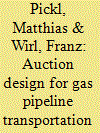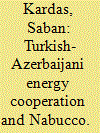| Srl | Item |
| 1 |
ID:
103346


|
|
|
|
|
| Publication |
2011.
|
| Summary/Abstract |
As a response to the Russian dominance of the EU's natural gas supplies and the EU's increasing gas demands, major gas pipeline projects are currently under way to enhance the EU's energy supply security. Oftentimes to raise financing and to allocate gas transportation capacities, auctions are carried out to allow gas shippers to book transportation rights.
In recent years, auctions have emerged as one of the most successful allocation mechanisms in the microeconomic theory. However, different auction designs can lead to different outcomes making the choice of auction design a decisive one, especially for divisible-good auctions. This paper seeks to give a formulation of an optimal auction design for gas pipeline transportation capacity. Specifically three different mechanisms are tested: (i) NPV allocation; (ii) pro rata allocation; and (iii) optimization. In addition, Nabucco is taken as a case study to empirically show results of such auction designs.
Results show that a trade-off between revenue optimization and fair allocation can be observed: allocation per optimization is the favorable auction design when revenue maximization is more important than fair allocation. On the other hand, pro rata allocation is the auction design to be chosen when fairness of allocation is considered most central.
|
|
|
|
|
|
|
|
|
|
|
|
|
|
|
|
| 2 |
ID:
099559


|
|
|
|
|
| Publication |
2010.
|
| Summary/Abstract |
The plan for the southern energy corridor delivering a new secure supply of natural gas to the European Union is shaped by projects for two pipelines-Nabucco and the South Stream. Economic rationales for both projects are far from solid as the prospects for returns on massive investments are doubtful due to uncertainty about demand. Much political effort has nevertheless been expended on advancing these competing 'mega-projects', which have acquired symbolic status in different approaches to securitization of energy matters. The continuing recession has not added much weight to common economic sense, which dictates that the most efficient way to bring Russian and Caspian gas to Europe is modernization and joint management of Ukrainian gas infrastructure. Parallel construction of both pipelines remains the most probable outcome of their 'race', while simultaneous cancellation could have saved resources and political faces.
|
|
|
|
|
|
|
|
|
|
|
|
|
|
|
|
| 3 |
ID:
105390


|
|
|
|
|
| Publication |
2011.
|
| Summary/Abstract |
This article examines the prospects of the Turkish government's rhetoric of following zero-problems with neighbors and pursuing 'positive-sum' strategies to foster regional cooperation. Through a detailed examination of the Turkish-Azerbaijani energy cooperation in the context of the Nabucco natural gas pipeline, the article concludes that this policy is unsustainable and Turkey will come under pressure to set a more realistic foreign policy agenda that prioritizes among the country's strategic relationships. Moreover, although many believe that Turkey's overtures to Armenia lie at the heart of the troubles in Turkish-Azerbaijani energy talks, this article suggests that the real causes are the diverging interests between the two countries due to the underlying incompatibilities of their energy policies, breeding a 'negative-sum' game.
|
|
|
|
|
|
|
|
|
|
|
|
|
|
|
|